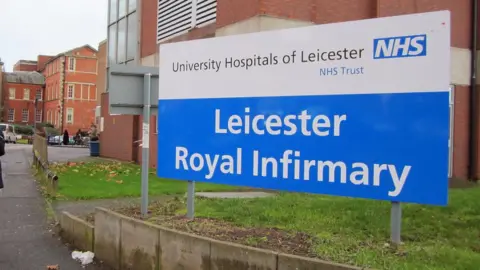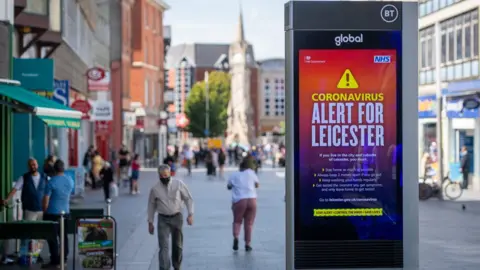Coronavirus: Trust stops non-urgent operations amid second wave fears
 PA Media
PA MediaSome non-urgent operations are being cancelled at a hospital trust amid fears the second wave of coronavirus will be worse than the first.
Leicestershire health boss Andy Williams said on Twitter people "have lockdown fatigue and staff are tired".
Pressure has been building in wards as cases continue to rise.
The University Hospitals of Leicester trust said cancer treatment, children's services and some non-urgent operations would still go ahead.
The Leicester, Leicestershire and Rutland's clinical commissioning groups (CCGs) said their hospitals were treating 260 people with coronavirus, compared with 204 at the peak in April.
'High escalation'
Mr Williams, chief executive of the CCGs, said: "Our hospitals continue to treat people needing urgent care, including those with cancer, while some non-urgent procedures will continue where possible.
"We apologise to those who have had their surgery temporarily postponed, their appointments will be rescheduled as soon as possible."
He had earlier tweeted: "Second wave looks like it's going to be much worse than the first - plus people have lockdown fatigue and staff are really tired."
Leicester and the neighbouring borough of Oadby and Wigston had England's 12th and 10th highest rates of infection respectively in the week leading up to 14 November, according to official figures.
For Leicester the rate was 519.2 per 100,000, while for Oadby and Wigston it was 527.9.
 PA Media
PA MediaLast month medics at Leicester's hospitals said they had been close to discharging the "last couple" of coronavirus patients before cases started to rise again.
Two weeks ago 150 patients were being treated across the trust's three hospital sites, with 18 of those infected being treated in intensive care.
On Friday patients arriving at A&E at the Leicester Royal Infirmary were having to wait up to five hours in the back of ambulances due to demand.
The trust has not yet said how many non-urgent operations are affected but a spokeswoman said a "high number" would continue.
She said patients should attend appointments unless told otherwise.

Follow BBC East Midlands on Facebook, Twitter, or Instagram. Send your story ideas to [email protected].
